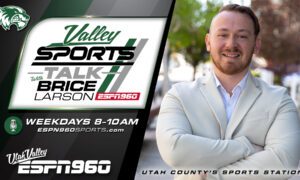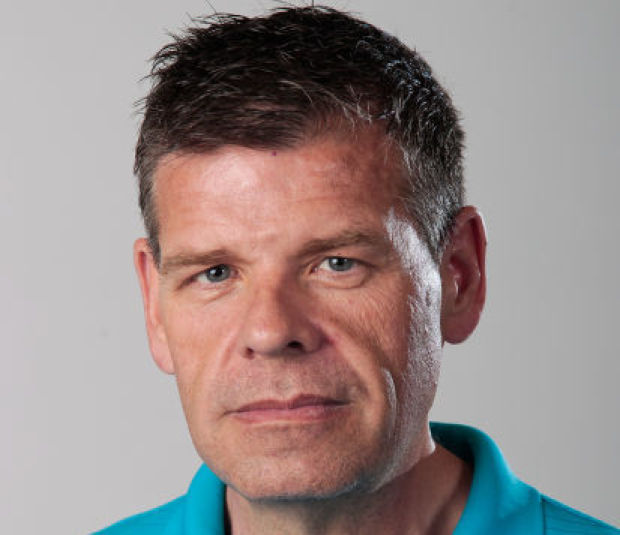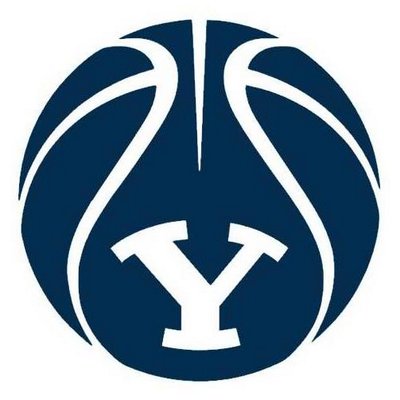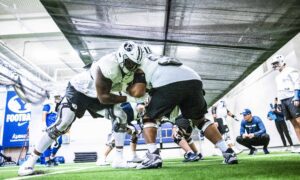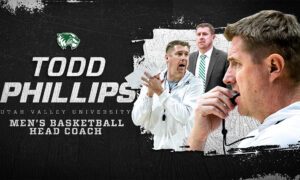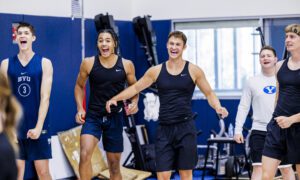SALT LAKE CITY (USA Today) — A few years ago, Larry Krystkowiak’s wife ran into just the right man at an NBA game who could best explain the significance of her husband’s poker face.
“In the NBA we talk, we get in each other’s faces,” Magic Johnson told Jan, who married Krystkowiak 18 years ago. “Your husband doesn’t say anything. That scares a lot of people because we can’t read him. He looks at us and we go, ‘Oh, man, we are in trouble.’ ”
As Duke’s Mike Krzyzewski closes in on 1,000 victories, another Coach K is garnering increasing attention in his fourth season at Utah, which is ranked 11th nationally and positioned as a national contender for the first time since the Rick Majerus era.
Krystkowiak, who led his alma mater Montana to back-to-back NCAA tournament appearances in 2005 and 2006, possesses a unique résumé — a nine-year NBA playing career with six teams and head-coaching stints with the Milwaukee Bucks and the CBA’s Idaho Stampede — and also cuts an imposing figure at 6-foot-9 who can intimidate without having to raise his voice.
But what most distinguishes Krystkowiak is his demeanor. With a deft ability to strike the right chord with his players, he is nothing if not unpredictable.
Walk into his office before one of Utah’s biggest games of the season and see him strumming a limited-edition mahogany guitar given to him on his 50th birthday by fellow Montana native Jeff Ament, the bassist for Pearl Jam.
Walk onto the team bus after Utah’s resounding loss Saturday at Arizona and hear Krystkowiak tell his disheartened team, “Hey, look out the window, what is that? The sun is coming up. Don’t you get it? The sun still comes up.”
Trying to predict his moves can be futile because he has affinity for, as his wife affectionately puts it, “weird things.” Such as when he himself fertilized the grass between his Utah office and practice facility because the grass was brown. Or when he bought and installed bird feeders (before someone on campus stole them). Or when he brought a sprinkler in to water the grass because he wanted it to be appealing for recruits.
“He was out there every day with his sprinkler,” Jan Krystkowiak said, laughing. “A little bit of a perfectionist.”
***
What shaped Larry Krystkowiak’s world view and approach to his job were a turbulent childhood and the influences of several high-profile and diverse coaching figures, notably Mike Montgomery, Phil Jackson and Jerry Sloan.
No greater an authority on intensity than Sloan — the old-school, no-frills acclaimed former Utah Jazz coach — has admired Krystkowiak for that ethic since Krystkowiak played for him two decades ago and in recent years as their families have become closer.
“To me, he’s just like a country boy — go out there and work and go get it,” Sloan said. “He expects players to be on time and believe they are not bigger than the program. Then you have a chance to coach them a little bit … Oh, he is intense. He gets red-faced a little once in a while.”
Utah junior Dakarai Tucker said, “I thought he was an angry dude when I first met him. He looked scary when I saw him. But when he smiles, you smile.”
The seeds of that intensity were planted in Shelby, Mont., 25 miles from the Canadian border. It was a frigid town of then-4,000 people. As a child, Krystkowiak never knew that snow wasn’t supposed to fly in sideways at a severe angle.
His dad, Bernard, was a railroad worker. His mom, Helen, always supported his love of sports. When he was 8, he was resting with his mom when he asked her if she wanted him to be a pro football or basketball player. She’d be happy with what made him happy.
Soon after, she died of Hodgkin’s disease. His dad would remarry, which triggered the start of a traumatic period of emotional hardship for Larry, stemming from his relationship with his stepmother. He ultimately moved in with his brother Bernie, who is nine years older and who played a pivotal role in Larry’s development.
Basketball became a psychological refuge. Coaches and teammates became an extension of family. Sport gave him a purpose. That was evident to his college coach, Montgomery, who saw in Krystkowiak a motivation to prove to himself or others that “he had worth and was a good person, all the amateur psychologist-type stuff. It really did drive him.”
Over the entirety of his coaching career, Montgomery said, he didn’t coach many, if any, players whose intensity rivaled that of Krystkowiak, who was a three-time Big Sky Conference most valuable player. He arrived at Montana 6-7, 185 pounds. He was a fanatic in the weight room. He had sharp elbows on the court.
Montgomery remembers traveling to Bloomington, Ind., in April 1984 to watch Krystkowiak compete in the U.S. Olympic Trials, fully aware that “even the notion that he had a chance to make that team was ridiculous.” But Krystkowiak competed hard, battled and impressed the team’s coach, Bob Knight.
During one on-court sequence, Montgomery recalls, Patrick Ewing caught Krystkowiak with an elbow in his upper chest-throat area that would have felled 99% of players. But Krystkowiak turned around and ran back down court even with his eyes watering and his face fire-engine red.
When Montgomery later asked him how he could keep playing, Krystkowiak said, “Coach, if I go down, I’m done. There is no way I can go down. I don’t care what the circumstances are.”
The coach of Krystkowiak’s fifth NBA team, Phil Jackson of the Chicago Bulls, helped him learn temperament. During film sessions, Krystkowiak would watch an even-keeled Jackson criticize anyone on the team for mistakes, even Michael Jordan.
“Maybe if it weren’t for Phil’s influence Larry wouldn’t even be able to keep his shirt and tie on (during games),” his brother Bernie Krystkowiak said. “Maybe he’d be a cauldron ready to explode if not for Phil’s influence. Sometimes it seems like the wheels are coming off and Larry has almost a smile in the timeout saying, ‘We’re not falling off the deck of the ship yet.’ ”
Over the years, his brother has watched him diffuse near fistfights with just a couple sentences. Even on a recent road trip, Bernie watched a student section fixate its attention on Krystkowiak, whom fans heckled mercilessly. Krystkowiak turned around and hollered something to them. They started belly laughing. Later they were sitting almost silent, with arms folded.
“Boy, did they diffuse them or what?” Bernie said. “Larry listens to it, listens to it. Then he thinks of something really good and pulls the rug right out from under them.”
***
Krystkowiak was dedicated to his pro basketball playing career and did not marry until his mid-30s in part because he was unsure if he could be a great husband and father. As a child, he never saw the blueprint for what one looked like. He wasn’t sure he was “equipped to do it, so I wasn’t necessarily sure he was going to try it.”
Then he spotted a high-energy woman named Jan playing darts with a group in a Milwaukee sports bar. He walked up to her out of the blue and challenged her to a game. He had never played darts in his life. The stakes: The loser had to cook dinner for the other. She won handily.
He cooked her some pork chops. Despite earning a salary with the Bucks, he owned only two plates and two forks.
“I can’t cook,” he said. “Fortunately she can’t either so she couldn’t figure out what a quality meal was.”
They now have five kids and three dogs. Krystkowiak doesn’t bring the frustration from losses home and has talked to his wife only about two team issues during his entire coaching career. Letting go of anger over his childhood, he said, has been liberating and has helped him appreciate what he has personally and professionally.
“I think it (childhood) created an edge in me; you want to overcome and do something special,” he said. “You’re thinking, ‘I’ll be damned if I am going to let this shape me.’ I am so blessed to have a family of my own and be in this job. It’s like spilled milk. Like one of my shrinks told me (about the trauma), the wicked witch is gone. The wicked witch is dead.”
When he took over the Utah job four years ago, Sloan viewed it as an almost impossible job. The team won six games that first season. Tommy Connor, the team’s associate head coach, said one of Krystkowiak’s biggest strengths was the patience he exhibited at the start of his tenure.
Now with more talent and his team poised to return to the NCAA tournament for the first time since 2009, Krystkowiak continues to keep players — and other teams — off balance with that poker face.
As Montgomery said, “He certainly has everybody’s attention.”




